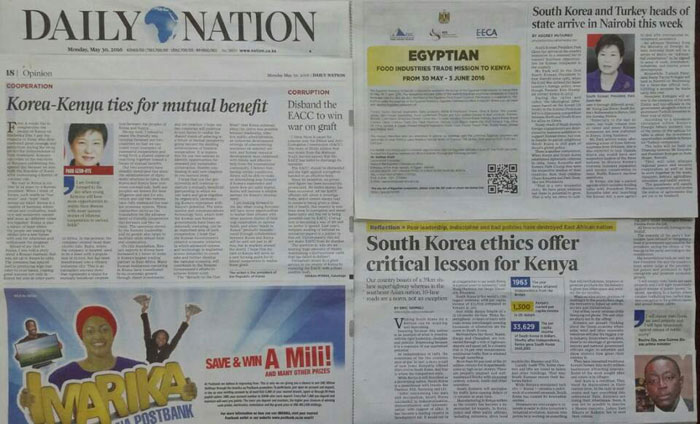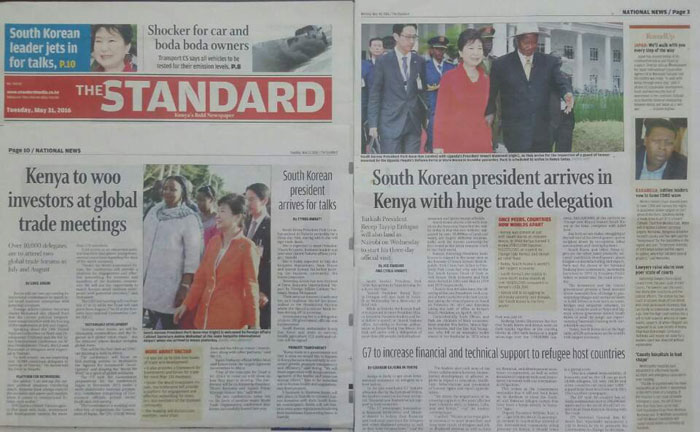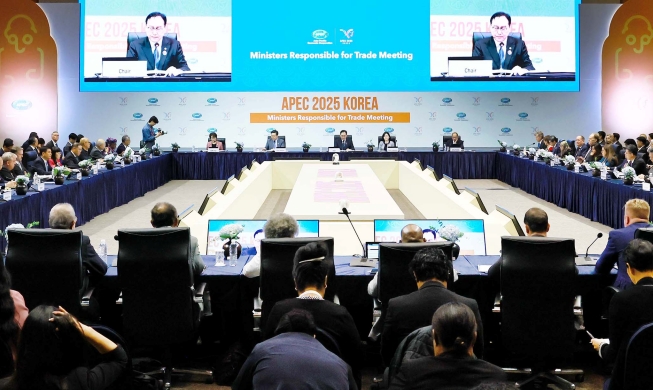President Park Geun-hye’s visit to Kenya seems to be offering the East African nation an opportunity to look back upon itself, all while reviewing Korea’s global role today as a model for developing countries.
On May 29, Kenya’s largest newspaper, the Daily Nation, reflected sharply on the current differences between Korea and Kenya, since both countries suffered a similar level of poverty some 50 years ago. The daily focused on what lessons Korea’s development could give to Kenya.
In the article titled “South Korea ethics offer critical lesson for Kenya” in the newspaper's World section, Eric Shimoli investigated the problems his country faces, all while comparing the reality of both countries today.


The author strongly criticized his country’s economic progress, where citizens today are acutely aware of the facts on the ground. “Our country boasts of one 35-kilometer six-lane superhighway, whereas in the Asian nation, 10-lane roads are the norm, not an exception,” he wrote.
The writer confesses that visiting South Korea can be both “inspiring and depressing” for Kenyans. He said, “Inspiring because [South Korea] is an example of what is possible with the right leadership, discipline and policies. Depressing because it is a reminder of [Kenya's] unattained potential.”
Mentioning Kenya’s per capita income of only USD 1,300, he said, “Korea is the world’s 15th largest economy.” The article also spoke about Korea’s development in detail, saying that, “Metropolises like Seoul, Busan, Daegu and Chungbuk are connected through a web of highways, airports and speed rail. In a country that is 70 per cent mountainous, continuous traffic flow is attained through tunneling.”
While claiming that manufacturing in Kenya suffers due to the country’s concentration on imports, the writer said that, “In Korea, police and other public officials, including ministers, drive local models like Daewoo and Kia... That way, South Koreans ensure their factories thrive.”
Comparing high-tech cities in both countries, the writer said, “While Kenya’s envisioned tech city -- Konza -- remains a patchwork of contested savannah, South Korea has created 80 innovation centers.” The writer envied the fact that free office space and printers are given to "anyone who proves they are working on something that will revolutionize, improve or generate products for the industry."
The writer also expressed his positive impression of South Korea's government officials. He said, “Everywhere one goes, there is no shortage of governors, mayors and national government officials eager to entertain and show visitors how great their country is.”
The writer said that Korean public officers “converted traditional Korean homes into multi-million [dollar] businesses attracting tourists,” while stating the local stipulation that, “They must be maintained in their current form.”
The article criticized Kenya by saying that, “Kenyans are losing their inheritance,” as they are “in the rush to modernize and turn everything into retirement flats.”
Finally, the writer concluded by saying that, “Soon, it may not be possible to describe a Maasai manyatta, Luhya, Luo, Kikuyu or Kalenjin hut or even their cuisine,” mentioning the traditional housing unit for five of Kenya's main ethnic groups.
Here is one clear fact: Kenya is not the only country to which such sharp criticisms apply. These sharp criticisms also apply to Korea itself, as it loses its traditional values under the cause of material wealth and economic efficiency.
By Wi Tack-whan, Yoon Sojung
Korea.net Staff Writers
whan23@korea.kr
On May 29, Kenya’s largest newspaper, the Daily Nation, reflected sharply on the current differences between Korea and Kenya, since both countries suffered a similar level of poverty some 50 years ago. The daily focused on what lessons Korea’s development could give to Kenya.
In the article titled “South Korea ethics offer critical lesson for Kenya” in the newspaper's World section, Eric Shimoli investigated the problems his country faces, all while comparing the reality of both countries today.


The author strongly criticized his country’s economic progress, where citizens today are acutely aware of the facts on the ground. “Our country boasts of one 35-kilometer six-lane superhighway, whereas in the Asian nation, 10-lane roads are the norm, not an exception,” he wrote.
The writer confesses that visiting South Korea can be both “inspiring and depressing” for Kenyans. He said, “Inspiring because [South Korea] is an example of what is possible with the right leadership, discipline and policies. Depressing because it is a reminder of [Kenya's] unattained potential.”
Mentioning Kenya’s per capita income of only USD 1,300, he said, “Korea is the world’s 15th largest economy.” The article also spoke about Korea’s development in detail, saying that, “Metropolises like Seoul, Busan, Daegu and Chungbuk are connected through a web of highways, airports and speed rail. In a country that is 70 per cent mountainous, continuous traffic flow is attained through tunneling.”
While claiming that manufacturing in Kenya suffers due to the country’s concentration on imports, the writer said that, “In Korea, police and other public officials, including ministers, drive local models like Daewoo and Kia... That way, South Koreans ensure their factories thrive.”
Comparing high-tech cities in both countries, the writer said, “While Kenya’s envisioned tech city -- Konza -- remains a patchwork of contested savannah, South Korea has created 80 innovation centers.” The writer envied the fact that free office space and printers are given to "anyone who proves they are working on something that will revolutionize, improve or generate products for the industry."
The writer also expressed his positive impression of South Korea's government officials. He said, “Everywhere one goes, there is no shortage of governors, mayors and national government officials eager to entertain and show visitors how great their country is.”
The writer said that Korean public officers “converted traditional Korean homes into multi-million [dollar] businesses attracting tourists,” while stating the local stipulation that, “They must be maintained in their current form.”
The article criticized Kenya by saying that, “Kenyans are losing their inheritance,” as they are “in the rush to modernize and turn everything into retirement flats.”
Finally, the writer concluded by saying that, “Soon, it may not be possible to describe a Maasai manyatta, Luhya, Luo, Kikuyu or Kalenjin hut or even their cuisine,” mentioning the traditional housing unit for five of Kenya's main ethnic groups.
Here is one clear fact: Kenya is not the only country to which such sharp criticisms apply. These sharp criticisms also apply to Korea itself, as it loses its traditional values under the cause of material wealth and economic efficiency.
By Wi Tack-whan, Yoon Sojung
Korea.net Staff Writers
whan23@korea.kr
